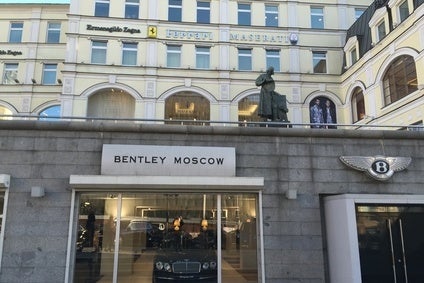You might be forgiven for thinking the Russian Federation was at the edge of an economic precipice at the moment, facing a potential avalanche of catastrophic bad news that even for this battle-hardened country is especially daunting.
Seemingly assailed from all sides with an explosive cocktail of sky-high interest rates, soaring inflation, a rapidly depreciating Rouble and the 50% collapse in oil prices, it is no surprise the Russian automotive sector is undergoing yet another seismic contraction.
The numbers from the AEB make for sober reading and they come on the back of the Moscow-based business association recording almost unrelentingly gloomy and unnervingly steep falls in sales during the past year.
Just last month alone passenger cars and LCVs fell an extraordinary 38%, prompting many to wonder where the bottom really lies in this most volatile of markets.
I’ve been in Moscow this week at the 18th Russian Automotive Forum (RAF), trying to absorb the mood music of a country that quite apart from its economic travails, has to cope with the steely political glare from London, Paris, Brussels and Washington, whose barely concealed hostility towards The Kremlin following its annexation of Crimea and alleged involvement in destabilising East Ukraine, has resulted in punitive sanctions that are really biting.
Talking to the CEO’s of AvtoVAZ and GAZ Group, Bo Andersson and Vadim Sorokin in Moscow, as well as the head of Peugeot Citroen’s joint venture with Mitsubishi, PCMA Rus, Jean-Christophe Marchal, it’s clear that more than sanctions or even the threat of increased punishment from the West, is the exorbitant cost of accessing finance.
The Kremlin hiked interest rates to eye-watering levels recently only to backtrack slightly last week by shaving them 1% to 14%, but nonetheless capital is extraordinarily hard to secure at such stratospheric levels.
It’s quite possible Moscow is going with the lesser of two evils by looking at interest rates rather than inflation, but the borrowing costs, coupled with a plunging rouble rate have made OEMs and suppliers with little local Russian content, extremely vulnerable to the currency which has lost a third of its value in remarkably short time.
Speaker after speaker this week extolled the virtues of localisation – now suddenly thrust blinking into the spotlight of necessity – while Marchal from PCMA even went one step further urging the ‘Russification’ of his workforce to allow indigenous managers to start running the plant in Kaluga.
Of course there’s a financial imperative to PCMA in terms of hiring cost, but Marchal’s trust and faith in Russian managers shows just how rapidly the country has progressed in fast-tracking its staff to very senior positions.
But there’s another aspect to this situation that forcefully struck me this week and that’s the sheer resilience of Russians, who are unwilling to give in to yet another grimly gloomy economic scenario.
Quite simply they’ve been here before and many times too. RAF delegate after delegate metaphorically shrugged their shoulders to me and said they had seen umpteen crises come and go – and mainly go.
This is a country that has seen a tidal wave of history pour over it in the last 100 years; lurching from Tsarist autocracy to Stalinist dictatorship, from Gorbachev perestroika to Putin Cold War revival and it’s not about to be cowed by the latest plunge in confidence.
There was a defiance about the RAF this week, which I found genuinely surprising. Yes, companies are hurting with the brutal exchange rate and crippling interest levels.
But that’s also creating and driving genuine opportunity for Russian companies to step up and take full advantage of the serious chance to perform with domestic brands and home-manufactured components.
Localisation has never been more important – it helps of course the Russian government mandates domestic content – but the imperative to manufacture at home is now starkly evident.
Russia will emerge from this crisis just as it has from countless other challenges. This is the country with the largest landmass on earth – nine time zones stretching from Smolensk in the West to Vladivostok in the Russian Far East testify to its endless space and the potential for this market – while clearly not at the moment – could well see those predictions of a 4m car parc realised.
Only this week, automakers have announced temporary freezes in production (or permanent, in GM’s case) but this is one market where being in for the long-haul will definitely bear fruit.
Russia is not going away any time soon.







